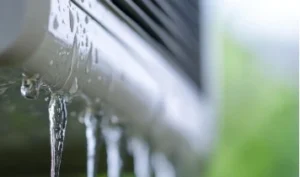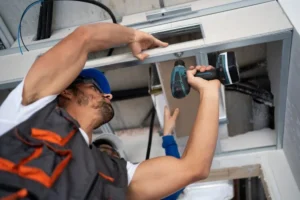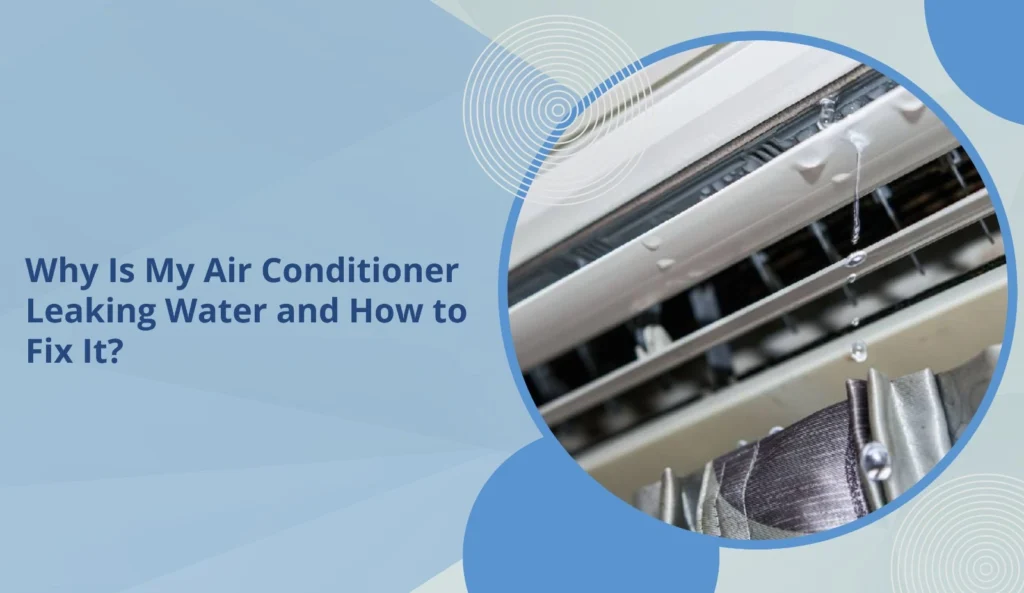Why Is My Air Conditioner Leaking Water and How to Fix It?
Hello Reader!
Welcome to the blog page of Rup Air Condition, one of the best AC repair center in Kolkata.
As summer heats up, your air conditioner becomes an essential appliance in your home or office. But what happens when you notice your air conditioner leaking water? Not only is it frustrating, but it could also lead to water damage, mold growth, and reduced AC performance. At Rup Air Condition, one of the best AC repair centers in Kolkata, we often receive this query from customers. So, let’s break it down.

Why Is Your Air Conditioner Leaking Water?
Several reasons could be behind your air conditioner leaking water. Identifying the right cause is the first step to fixing the issue.
1. Clogged or Dirty Drain Line
Over time, dirt, dust, and mold can accumulate in the condensate drain line, leading to a blockage. When this happens, the water that should be drained outside backs up and leaks from your unit instead.
2. Frozen Evaporator Coil
A frozen evaporator coil can cause excess condensation. When it melts, the collected water can overflow the drain pan and leak into your home. This is a common issue we address at Rup Air Condition, where trained professionals handle such AC faults with precision.
3. Damaged or Rusted Drain Pan
If your AC unit is older, the drain pan could be corroded or cracked, allowing water to leak out instead of being directed to the drain line.
4. Low Refrigerant Levels
Low refrigerant reduces pressure in your AC system, which can cause the evaporator coil to freeze. When it thaws, it may cause water leakage. This is a more complex issue that requires professional help from one of the best AC repair centers in Kolkata.
5. Improper Installation
Sometimes, improper AC installation or incorrect sizing can lead to uneven pressure, causing water to accumulate and leak. Trust experts like Rup Air Condition to check if your system is installed correctly.
6. Broken Condensate Pump
If your AC unit is installed in the basement or a location below ground level, it may use a condensate pump. If this pump fails, the water has no way to escape, resulting in leakage.

How to Fix a Leaking Air Conditioner?
While some minor issues can be handled at home, most problems require professional assistance. Here’s what you can do:
Use a wet/dry vacuum or a stiff wire brush to remove blockages. Regular maintenance prevents such problems in the future.
-
Check and Replace the Drain Pan
Inspect the drain pan under the evaporator coil. If it’s damaged or rusty, replace it immediately.
A dirty air filter can restrict airflow, causing the coil to freeze. Replace your air filter every 1–2 months.
-
Refill Refrigerant (By Professionals)
Low refrigerant levels require professional handling. Call Rup Air Condition, one of the best AC repair centers in Kolkata, to safely check and refill the refrigerant.
Check if the condensate pump is working. If not, it may need to be cleaned or replaced.
When to Call the Professionals?
If you’ve tried basic fixes and your air conditioner is still leaking water, don’t wait. Continuous leakage can damage your walls, ceilings, and furniture. That’s where Rup Air Condition comes in. As one of the best AC repair centers in Kolkata, we offer:
- Expert diagnosis and repair
- Affordable and transparent pricing
- Fast response time
- AMC (Annual Maintenance Contracts)
- Genuine spare parts and warranties

How do I identify if my AC leak is due to a frozen coil or drain blockage?
You can distinguish whether your AC leak is due to a frozen coil or a drain blockage by observing specific symptoms and conducting a few checks:
Signs of a Frozen Coil
- Reduced Cooling or Warm Air: If your AC is running but not cooling effectively, or it’s blowing warm or lukewarm air, a frozen coil could be the cause.
- Visible Frost or Ice: Open the indoor unit’s access panel and look for visible ice or frost on the evaporator coil or refrigerant lines.
- Water After Thawing: If you notice water leaking or pooling after the unit has been off for a while, it could be from the ice melting off the frozen coil.
- Unusual Noises: Sometimes, hissing or bubbling sounds may accompany frozen coils, especially if low refrigerant is involved.
- High Indoor Temperature: Your thermostat may not match the actual room temperature, indicating poor cooling performance due to coil freezing.
Signs of a Drain Blockage
- Consistent Water Pooling: If you see steady water accumulation around the indoor unit, especially when the AC is running, a clogged drain line is likely.
- No Cooling Issues: The AC may still cool the room normally, but water leaks persist, pointing to drainage rather than cooling problems.
- Gurgling or Bubbling Sounds: These noises near the drain line can indicate a blockage.
- Overflowing Drain Pan: If the drain pan is full or overflowing, the condensate is not draining properly, suggesting a blockage.
- No Ice on Coils: When you inspect the evaporator coil and find no frost or ice, but water is still leaking, a drain blockage is more probable.
How to Check
- Turn off the AC and inspect the evaporator coil for ice. If you see ice, it’s likely a frozen coil issue.
- Check the drain pan and drain line. If the pan is full and the line is clogged or disconnected, it’s likely a drain blockage.
- Listen for abnormal sounds: Bubbling or gurgling near the drain line points to a clog, while hissing near the coil may indicate low refrigerant and freezing.
What to Do
- For a frozen coil, check and replace dirty air filters, ensure vents are open, and call a professional if you suspect low refrigerant.
- For a drain blockage, clean the drain line with a brush or vacuum, or contact a technician if the clog is severe.

How often should I schedule maintenance to prevent water leaks in my AC?
To prevent water leaks in your AC, you should schedule professional maintenance at least once a year, ideally before the start of the cooling season in spring. Annual servicing allows a technician to thoroughly inspect, clean, and maintain key components—such as the drain line, coils, and filters—reducing the risk of clogs, blockages, and leaks.
If your AC is older, used heavily, or operates in a dusty environment, consider maintenance twice a year for optimal performance and leak prevention. In between professional visits, regularly check and replace air filters every 1–3 months and keep the area around your unit clean to further minimize leak risk.
Consistent, scheduled maintenance is the most effective way to ensure your AC runs efficiently and remains leak-free throughout the year.
What are simple DIY steps to stop water leakage before calling a professional?
If your air conditioner is leaking water and you want to stop it temporarily before calling a professional, here are some simple DIY steps you can try:
- Turn Off the AC and Power Supply
To avoid electrical hazards and further damage, switch off your AC and unplug it or turn off the circuit breaker before inspecting or attempting any fixes.
- Check and Clean the Condensate Drain Line
A clogged drain line is a common cause of water leakage. Locate the drain line and use a wet/dry vacuum or a long flexible brush to clear any blockages. This helps water drain properly and prevents overflow.
- Inspect and Replace Air Filters
Dirty air filters reduce airflow, causing the evaporator coil to freeze and then leak water when thawing. Clean or replace your filters regularly (every 1–3 months) to maintain proper airflow.
- Clear the Drain Pan
Look under the indoor unit for the drain pan that collects condensation. If it’s full or dirty, clean it with soap and water to allow water to flow freely to the drain line.
- Check for Ice on the Evaporator Coil
If you see frost or ice buildup, turn off the AC and let the ice melt completely. This may temporarily stop the leak, but you’ll need professional help to address the underlying cause like low refrigerant or airflow issues.
- Ensure Proper Unit Leveling
Make sure your AC unit is level. If it’s tilted, water may not drain correctly and leak inside. Adjust the unit’s position if possible.
- Use Towels or a Bucket to Catch Drips
While performing these steps, place towels or a bucket under the leak to prevent water damage to floors or furniture.
Also Read: Is It Better to Repair or Replace a Faulty Refrigerator?

How can I identify if a leak is from a pipe, fixture, or wall crack?
You can identify whether a leak is coming from a pipe, fixture, or wall crack by observing specific signs and using a systematic approach:
1. Signs of a Pipe Leak
- Sounds: Listen for dripping, hissing, or running water sounds inside walls or floors, especially when all fixtures are turned off.
- Water Pressure Drop: Sudden, unexplained drops in water pressure often indicate a pipe leak.
- Water Stains & Damage: Look for spreading stains, discoloration, or soft, warped drywall on walls or ceilings, especially near plumbing lines.
- Mold Growth: Persistent dampness from a hidden pipe leak can cause mold or a musty odor.
- High Water Bills: A sudden spike in your water bill may signal a hidden pipe leak.
2. Signs of a Fixture Leak (e.g., faucets, toilets, showers)
- Localized Wetness: Water pools or dampness are directly under or around a fixture like a sink, toilet, or shower.
- Dripping Sounds: Rhythmic, intermittent dripping near the fixture, especially after use.
- Visible Drips: You can often see water dripping from the fixture or its connections.
3. Signs of a Wall Crack Leak
- Discoloration After Rain: If stains or dampness appear on exterior or interior walls after rainfall, it may be due to water seeping through a wall crack rather than plumbing.
- Cool or Damp Spots: Feel for cool or damp patches on walls, especially after rain or in basements.
- Bubbling Paint/Peeling Wallpaper: Moisture from wall cracks often causes paint to bubble or wallpaper to peel away.
- No Plumbing Nearby: If the affected wall is not near any plumbing lines or fixtures, a wall crack is more likely the source.
How to Confirm the Source
- Turn Off All Water Fixtures: If you still hear water running or see the water meter moving, it’s likely a pipe leak.
- Check During and After Rain: If dampness appears only after rain, suspect a wall crack or exterior seepage.
- Inspect Fixtures: If leaks are only present when a fixture is in use, the fixture or its connections are likely at fault.
By carefully observing these signs, you can narrow down whether your leak is from a pipe, fixture, or wall crack. If you’re unable to pinpoint the source, consult a professional for a thorough inspection.

FAQ
- Why is my air conditioner leaking water inside the house?
A clogged or dirty condensate drain line is the most common reason. When blocked, water backs up and leaks indoors.
- Can a dirty air filter cause AC water leakage?
Yes, a dirty air filter restricts airflow, which can cause the evaporator coil to freeze and later melt, leading to water leakage.
- Is a refrigerant leak related to water leaking from my AC?
Yes, low refrigerant can reduce pressure, causing the coil to freeze and eventually leak water when it defrosts.
- What should I do if my AC is leaking water?
Turn off the unit, check and replace the air filter, and clean the drain line. If the problem persists, call a technician.
- How can I prevent my air conditioner from leaking water?
Regular maintenance, cleaning filters, and inspecting the drain line can help prevent leaks and keep your AC running efficiently.
We take pride in being one of the best AC repair centers in Kolkata, offering high-quality repair, servicing, and installation of all major AC brands. Whether it’s a split AC, window unit, or a central cooling system, our certified technicians have the expertise to fix it right the first time.






